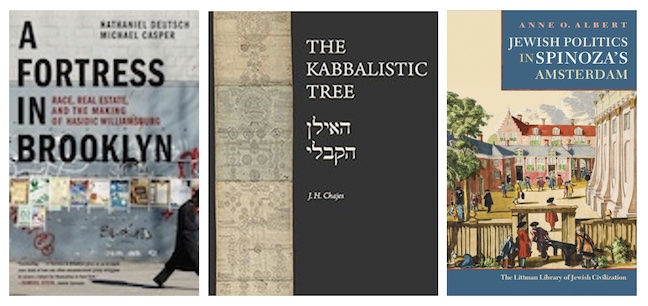Q&A: Katz Center Fellow Uzi Rebhun on the Importance of Counting
Natalie Dohrmann (NBD): Uzi, tell us a bit about your broad scholarly interests, what drew you to them, and what especially excites you about them personally and/or intellectually.
Natalie Dohrmann (NBD): Uzi, tell us a bit about your broad scholarly interests, what drew you to them, and what especially excites you about them personally and/or intellectually.

Join us in celebrating three past fellows who won recognition for their books by the 2023 Jordan Schnitzer Book award committee of the AJS.
In the spirit of these difficult times, we would like to highlight two special acquisitions that reflect the possibility of overcoming trauma and rebuilding lives. Thanks to the Mark S. Zucker Judaica Endowment, established by Katz Center board member Mark Zucker, we acquired the first edition of Viktor Frankl’s Trotzdem Ja Zum Leben Sagen [“Say yes to Life”] (Vienna: Franz Deuticke Verlag, 1946).
Last week saw the final meeting of a yearlong program that brought fellows together with rabbis from across the United States, to extend the reach of Jewish studies scholarship and use it to think about issues facing the American Jewish communities today. This was the sixth year of the program, called LEAP, which the Katz Center has offered through a partnership with Clal, engaging a new cohort of rabbis and scholars annually, with this year taking place remotely for the first time.
Steven P. Weitzman (SPW): You are one of the few Katz Center fellows in my time as director who combines training in history and the law (although we will have several next year in a year focused on Jews and the law). Can you tell us a bit about what led you to the study of legal history, intellectually and/or personally?
Thinking about the Atlantic world as its own arena, instead of approaching its various shores as disparate locales, has facilitated various kinds of recentering. Among other things, it has taught us to see early America as one part of a deeply interconnected world with enduring ties not only with the old country but also with the Americas (plural) and Africa. Focusing on networks spanning the Atlantic Ocean allows us to think differently about states, empires, and colonies—moving away from landed territorial notions to highlighting dynamic interaction and shared spaces.
Steven P. Weitzman (SPW): Ayelet, can you tell us a bit about the project you are working on at the Katz Center?
The Trump presidency saw the emergence of the alt-Right on the national stage. Figures such as Richard Spencer and groups like the Proud Boys became household names while the deadly Unite the Right rally in Charlottesville in August 2017 gained national attention. 2019 was the deadliest year for domestic terrorism in the nation since 1995, the year of the Oklahoma City bombing, and the Southern Poverty Law Center recorded at least nine hundred and forty hate active groups across the United States.
Steven P. Weitzman (SPW): Your research began far afield from this year's current focus on America's Jewish Questions. You did anthropological fieldwork in Uzbekistan and produced an excellent monograph on Bukharan Jews—you could have fit well into a recent Katz Center year focused on Jewish life in modern Islamic contexts. How then did you move from that focus and part of the world to your current project on American synagogues?
“This one hurts more,” my seventy-something congregant, a Philadelphia native, tells me as we observe that the new cemetery monument to the three men killed in an attack at our Pittsburgh synagogue in October 2018 is in the direct sightline of one dedicated in 2012 to those lost in the Shoah.